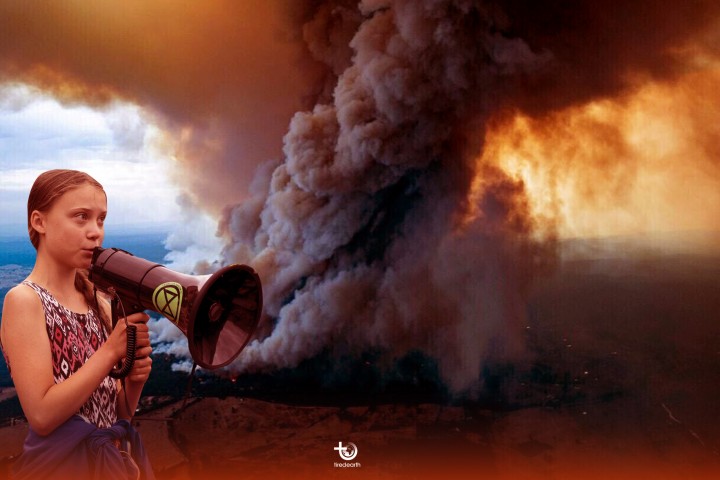Climate Change: Artistes Can Save the World

You remember the 1970 hit, "Big Yellow Taxi"? It was Joni Mitchell expressing environmental concern nearly five decades ago, and this reminds one of how long artistes have shown displeasure over environmental challenges around them, using what they do. At Mitchell's time, the big news was the exploitation of Carlifornia's red wood forests, just as deforestation, oil spill, air pollution, land degradation, etc., have always featured in the cause of human civilization; although, none of them has posed an existential threat to all life on earth the same way climate change now does. Global temperatures are at an all-time high, causing a spike in the risk of some types of extreme weather. Little more warming, and we are all flushed off the planet. But as disturbing as the facts have been, climate change refused to make headlines until towards the close of last year, when a Swedish teenager—Greta Thunberg—started to speak for everyone. Ever since Skul Strejk för Klimatet (School Strike for Climate) first appeared outside the Swedish parliament, the phrase 'climate change' has been flying around, especially on the social media, like a peregrine.
Greta has, between her first Stockholm appearance and now, gained different platforms to confront world leaders, scolding them for not doing enough to address a rapidly changing climate, and requesting them to act rather than just talk. Interestingly, decision makers expressed a renewed commitment to pursuing the Paris Agreement of keeping the earth's temperature below the UN's red line of 2 degrees centigrade above pre-industrial times, and this lead to the UK and Ireland parliaments declaring climate emergency. Polls have also risen in number for climate concerns in the last one year, courtsey of the Greta effect. But till this moment, the actions of politicians continue to betray their many promises to save the world, and their encomiums on Greta seem a mere face-saving gimmick. Actually, to think decarbonizing on the UN timeline would be a walk in the park is to live in a fool's paradise. It is, according to experts, "transformation on a billion-ton scale globally", i.e., consumption of coal and oil has to be reduced by billions of tons in ten years, and that, to those who preside over economies almost completely dependent on these variables, is a deep water.
Science says it is still possible to save the world, but politicians undoubtedly dread the economic pathway saving the world requires. This is explicit in the latest moves of some of their counterparts across the world, especially Russian and American leaders. Trump is sweating out to pull America—one of the very largest carbon emmiters—out of the Paris Agreement, while Putin wants to remind everyone “that the modern world is [too economically] complex" for a fairy tale climate demand. In Brazil also, the Amazon rainforest - world's largest carbon sink - is being opened to massive deforestation in addition to a human-induced wild fire that already claimed a good portion of it, and in all of these, my country's president just returned from Russia with an agreement to 'revitalize' refineries. What more evidences are needed to show that world leaders aren't taking the science seriously. These latest moves would have attracted everyone's anger if people had enough climate information to hold their leaders accountable. While it becomes clearer day after day that only a sense of public outrage can force decision makers into any tangible climate action, the trouble spot is that everyone is not aware, yet, and I'm afraid Greta and her millions of strikers might not be able to grow this kind of public awareness in due time.
An average bus conductor in Lagos still doesn't know what climate change means, or what Greta stands for. This I found so true a couple of months ago when I was to speak to about a thousand Nigerian youths on climate change. Before my speech, the audience was asked if anyone was aware of climate change, but not one person had an idea. This simply implies that even in this Greta era, only few millions can relate with climate science globally. Yet, we need 'everyone' to rise up and pressure decision makers into action. Greta, for one, hopes for a civil rebellion of this kind, thinking that "once people are aware they would come together and put pressure on people in power". Too many people are, however, still ignorant now for politicians to do something as huge as halving global carbon emissions in few years; but the message could get to everyone in the shortest time with the entry of artistes into the struggle.
Music, for instance, appeals to people of every tradition and background; it could break down the complexity of climate science and make it reach more people, just as, in what is described as the day music changed the world, Bob Gedolf and Midge Ure reached 1.9 billion people in a one-day musical concert in 1985, and the narrative of Ethiopians battling extreme famine changed forever. During South Africa's apartheid also, Steven Van Zandt and producer Arthur Baker founded "Artists United Against Apartheid" group which got singers to perform "Sung City", a notable protest song which contributed to the public outrage over Apartheid and raised a million USD for anti-Apartheid projects. Even film actors have brought landmark social changes across the world. The movie "Philadelphia", for example, changed public perception of stigma and fear surrounding Aids in the 1980s, and in 2016, Pakistani law on honour killing was reversed following the release of "A Girl in the River". These are just few of the many ways artistes have caused social changes around the world in recent times and now that the world faces its greatest threat, we can't need them more.
2018 IPCC report gave the world just twelve years to reverse a deleterious global warming, and a terrific one year which saw two cyclones in Mozambique, severe heat wave in parts of Europe, and desert advancement in Africa, has since gone; leaving us only eleven years to pick our odds and ends. The world needs artistes to stir up people's anger now, so that leaders could be forced to take advantage of the few more years of grace. But it isn’t just that. The reality of this time requires everyone to make most efficient use of resources and cut down waste in every area of life such as travel, food, housing, etc., and this cannot happen until no one is left unarmed with necessary information on how the things we love so much contribute to global carbon emissions. So, from whichever angle one chooses to look at it, climate change isn't just a thing of the placards and book pages; it needs be taken to the songs and movies that naturally get people's attention. Artistes enjoy a great deal of cross-border acceptance and popularity—they are also victims of climate change, meanwhile—and are in the best position to get the climate message to everyone (their fan, after all).

